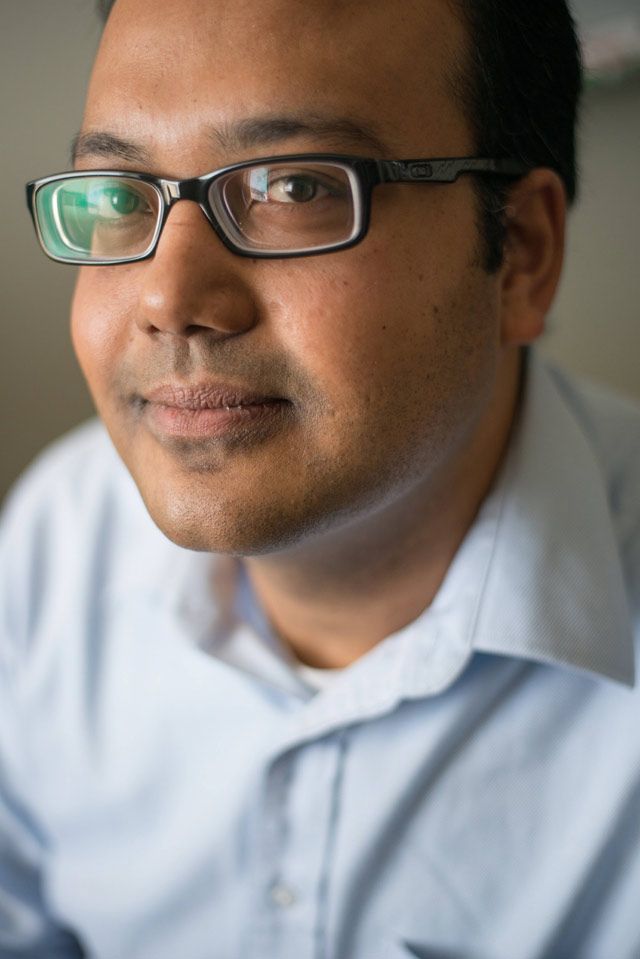Chemical engineer recognized by National Academy for impactful early career work
Lehigh University’s Jeetain Mittal is one of engineering’s rising stars, according to the prestigious National Academy of Engineering.
This September, Mittal, an associate professor of chemical and biomolecular engineering, was selected to participate in the NAE’s 21st annual Frontiers of Engineering Symposium. The symposium recognizes engineers ages 30-45 who are performing exceptional research work in a variety of disciplines. Mittal was one of 89 young engineers from industry, academia and government to be nominated and selected for the impact of their work.
“It was an honor to attend the symposium,” recalls Mittal. “It makes me proud that people are recognizing the work we’re doing here at Lehigh.”
Materials matter
Mittal’s research focuses on material design and synthesis-- arranging particles to create a variety of structures with specific properties. The composition of the particles creates predefined interactions, thereby dictating the type of structure that will be created. Mittal and his research team control the particles’ interactions, thus creating new useful structures.
While Mittal’s research focuses on the creation of new structures, he and his research team also work with other researchers to demonstrate how to develop such structures for a number of associated research applications – a potential boon to a variety of scientific fields.
“The NAE Symposium was a very good experience because most of my research has been interdisciplinary in nature,” Mittal said. “So in that sense this was a perfect opportunity to see trailblazing work in other areas and gauge how my research could be connected.”
The symposium took place at the National Academies' Arnold and Mabel Beckman Center in Irvine, CA, from September 9-11. The eighty-nine engineers discussed cutting-edge developments in four areas: Cybersecurity and Privacy, Engineering the Search for Earth-like Exoplanets, Optical and Mechanical Metamaterials, and Forecasting Natural Disasters. Leading experts in these four areas presented their research.
In addition to these presentations, the eighty-nine engineers were given the opportunity to speak with one another regarding their own research. It is through these conversations that issues within their own research were discussed and intriguing questions emerged.
Addressing, examining and debating each other’s research is the real value of these types of events, according to Mittal. The goal of the FOE symposium is to facilitate the collaboration of the brightest engineers from a variety of disciplines in the U.S. Through this collaboration, new techniques and approaches can be developed to sustain and build U.S. innovation.
“This is an unusual symposium,” Mittal reports. “At other symposiums, we often meet people who are like-minded and doing similar research. However, here we interacted with people engaged in all types of research work. The chance of two attendees being focused on the same field is rather low; it’s an event format that provides a wealth of perspectives and ideas that a researcher wouldn’t otherwise be able to consider.”
Mittal is the seventh Lehigh professor to attend a Frontiers of Engineering Symposium. In 1998, mechanical engineering professor John Coulter, currently serving as interim Dean for the P.C. Rossin College of Engineering and Applied Science, was the first Lehigh faculty member to attend the event. Since then, attendees from the Lehigh faculty have included Jeff Heflin of computer science and engineering, Kristen Jellison of civil and environmental engineering, Mayuresh V. Kothare of chemical and biomolecular engineering, Larry Snyder of industrial and systems engineering, and Nelson Tansu of electrical and computer engineering.
-Sarah Plombon '16 is a journalism student interning with the P.C. Rossin College of Engineering and Applied Science.

